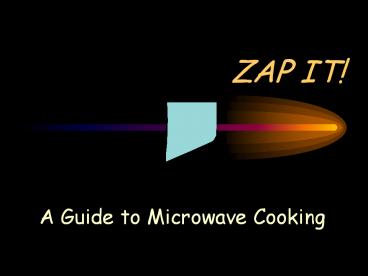ZAP IT! - PowerPoint PPT Presentation
1 / 17
Title:
ZAP IT!
Description:
... in food. Microwaves are ... Leave space between pieces of food. ... recipes for the microwave? Shorten time to the conventional time. Reduce the amount ... – PowerPoint PPT presentation
Number of Views:955
Avg rating:3.0/5.0
Title: ZAP IT!
1
ZAP IT!
- A Guide to Microwave Cooking
2
Advantages of Microwave Cooking
- Saves time
- Easy to clean up
- Energy-efficient
- Saves nutrients
- Use little or no added fat
- Cook serve in the same dish
- Ideal for convenience foods
3
Power the Microwave Oven
- Higher power setting more microwaves produced
- MW ovens have different power ratings measured
in watts - Dont use an extension cord
- with a MW oven it reduces
- its power
- MW power is reduced if
- other appliances are on
- the same electrical circuit
4
Power Settings
- High 100
- Medium-High 70
- Medium 50
- Medium-low 30
- Low 10
5
Defrost
- To defrost means to remove ice crystals from a
food without cooking the food - Defrost setting on a MW is usually 30 power
- Follow a defrost cycle with an equal amount of
standing time - Cook food immediately after
- defrosting do not hold it for
- later cooking
6
How does a microwave cook food?
- Microwaves are short radio waves.
- They cause the molecules
- in food to vibrate.
- Vibration creates friction.
- Friction creates heat.
- Heat cooks the food.
- MW penetrate food about 1½ deep. In thicker
foods, heat is conducted to the center.
7
Microwaves travel in a straight path
- Microwaves are reflected by metal.
- Microwaves pass through glass, paper, plastic,
and wax. - Microwaves are absorbed
- by water, fat and sugar
- molecules in food.
- Microwaves are attracted to salt wait
- until after cooking to salt the surface
- of a food.
8
Cookware for the Microwave
- YES
- Glass
- Most hard plastic
- Paper
- Some pottery china
- NO
- Metal
- Recycled paper
- Food storage containers, such as margarine tubs
9
Shape of Cookware
- Ring shape is best choice.
- Round is second best choice.
- Shallow cookware works better than deep.
- Square or rectangular shape is worst choice
because corners overcook before center is
finished.
10
What is arcing?
- Arcing is an electrical spark inside the
microwave oven. - It looks like lightning!
- It occurs when microwaves
- connect between two points
- of metal.
- It can cause a fire if
- flammable materials are inside the MW.
- It can damage the microwave oven.
11
Automatic Features on the Microwave
- Cook 1/Cook 2
- Defrost/Auto defrost
- Preprogrammed touch pads
- Sensors
- Turntable
- Temperature probe
12
When should food be covered?
- Covering -
- holds in steam
- keeps food moist
- shortens cooking time
- cooks more evenly
- reduces spatters
- Cover with
- Plastic wrap
- Waxed paper
- Paper towel
- Lid
13
Special Microwave Techniques
- Stir, turn or rotate
- Standing time
- Pierce
- Shield
- Vent
14
How should I place food in the microwave oven?
- Arrange foods in a ring.
- Arrange foods like the spokes of a wheel.
- Leave space between pieces of food.
- Arrange with the thickest parts toward the
outside of the ring.
15
Factors that Affect Timing
- Hot spots
- Density of the food
- Shape of the cookware
- Size of the food pieces
- Starting temperature
- of the food
- Amount of food in the oven at the same time
- of watts of the MW oven
16
Testing dishes containers
- Some equipment may not be labeled whether it is
MW-safe. - To test
- Place a Pyrex measuring cup of water
- in the MW.
- Place the equipment to be tested
- NEXT to the measuring cup.
- Microwave for 1 2 minutes.
- Water should be hot, but equipment being tested
should still be room temperature. - If it gets hot, do not use it in the MW.
17
How do I convert my favorite recipes for the
microwave?
- Shorten time to ¼ the conventional time.
- Reduce the amount
- of seasonings.
- Reduce the amount
- of liquid.
- Compare to a similar recipe.































